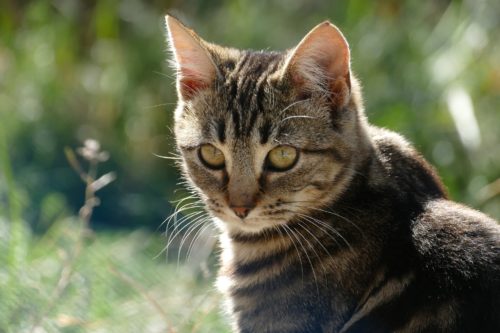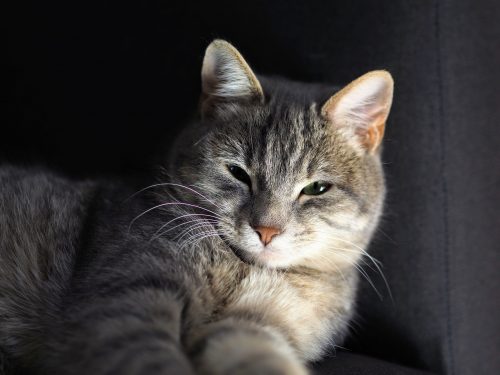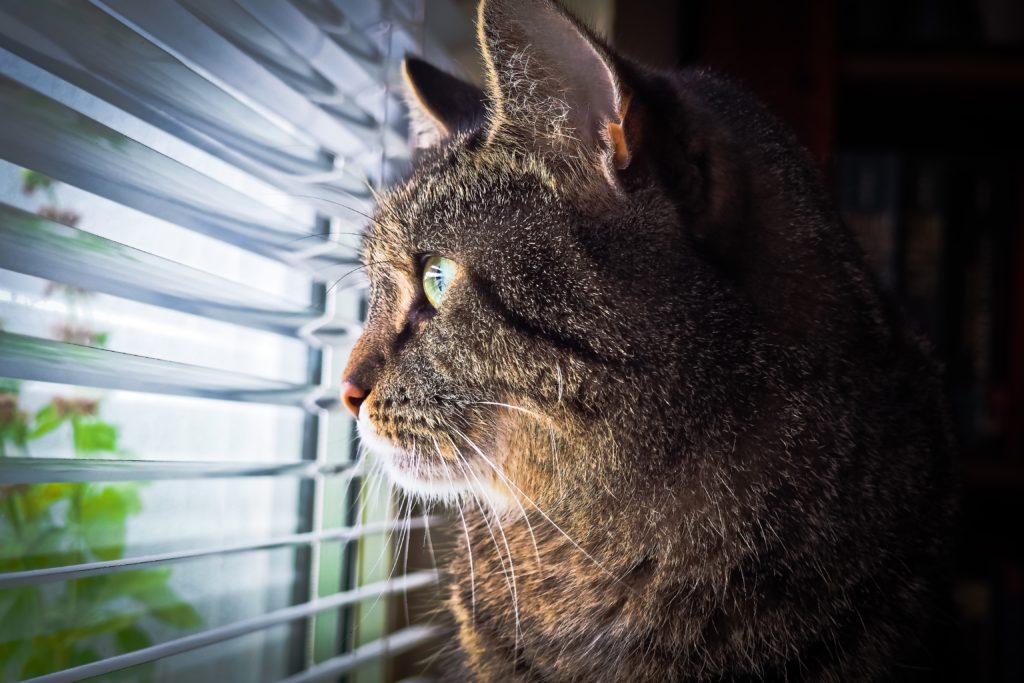Blindness can happen to any cat at any stage of their life. Just because your cat may be blind, does not mean he will have a reduced quality of life. In fact, many pet owners find caring for a blind animal to be quite rewarding, making the bond between the two even stronger than before. Even though it might surprise you, cats adapt very well to vision impairment and will take advantage of their other senses to go about their daily lives.
Blindness occurs when a cat has lost his vision in both eyes. Partial blindness can also occur, which can involve either one or both eyes but does not mean total vision loss. Just like with most feline health issues, blindness can be caused by a wide variety of factors ranging from trauma to cancer. In some cases, cats can even be born blind and have to adjust to their vision impairment early on.
Luckily, cats are resilient creatures. Their whiskers send information to their sensory nerves, allowing them to detect environmental factors without having to use their vision at all. Aside from that, cats will also depend on their sense of smell and hearing in order to get by. Some cat owners even report that they never even noticed that their cat was losing their vision until they were brought to the vet because they had adapted so well.
To understand this topic further, this article will go over all the possible causes of blindness in cats and what you can do as their owner to help them adjust to their vision impairment. Just remember, if your cat is going blind, this is not a death sentence by any means. Your furry companion will be just fine as long as you continue providing him with all the love and support you always have.
How to Tell if Your Cat is Blind?
Usually, when a cat is experiencing a loss of vision, there are a few signs to look for in their overall health. If you can detect that your cat is losing his vision, you may be able to delay the process through veterinarian treatment. Not only is it important to pay attention to your cat’s behavior and health on a daily basis, but it’s also critical that you take him to the vet for regular check-ups as often as necessary.
One of the easiest ways to tell that your cat is losing his eyesight is through his behavior. Is he acting clumsy and running into walls? Watch the way he gets around the house and interacts with furniture or other pieces that may be blocking a path. Cats are naturally good jumpers, so when your cat seems to miss his target or falls when he is leaping to the other counter, that could mean that he is having trouble seeing. Sometimes when a cat is losing his vision, he will also have a difficult time finding his water bowl, food, or bed. These are staples that your cat should be very familiar with, so when he has a difficult time finding them, you can suspect that his vision is going.
Have you noticed your cat making more vocalizations than normal? Some cats will make noises when they are feeling distressed. Along with this, they may experience a generalized anxiety that is not normal for their regular behavior. If your cat is hiding, upset, or appears to be fearful, that means something is bothering him internally. Regardless if it is his vision or any other issue, a cat with these behavioral changes should be checked out by a veterinarian.
If your cat is losing his vision, he may also have changes within his actual eyes themselves. Check the size of the pupils and if they are the same in both eyes. You can also test his pupils to see if they adjust to dark and light spaces. If his pupils are unable to adjust or are different sizes, this could mean that your cat is experiencing vision problems. A change in the actual color of his eyes is also a tell-tale sign that your cat is losing his vision. Look out for redness or an opaque/milky appearance in the whites of his eyes.
The last important sign that your cat may have vision impairment is by the way they walk. Do they walk hesitantly with their head close to the ground? Another behavior to keep an eye out for is if they are bobbing their head up and down as they walk around furniture. This action is usually done when a cat is trying to figure out distances. By paying close attention to your cat’s health and behavior, you should be able to spot when they are having trouble seeing. If your cat has exhibited one or more of these behaviors, take them to the vet for a vision exam.
What Causes Cat Blindness?
Cat blindness can come on suddenly or over a long period of time depending on the underlying cause. Since there are so many possible causes of blindness, it can be challenging to know what’s inflicting your furry friend without veterinarian assistance. The sooner you are able to spot a loss of vision in your feline, the better the chance you can slow down or halt the issue altogether. Some of the most common causes of blindness in cats include:
Retinal Diseases
Whether a cat is experiencing progressive retinal atrophy or degeneration, both conditions will lead to a loss of vision. In the case of PRA, a cat’s photoreceptors within the eye will degenerate as the cat ages. Generally, with this eye problem, cat’s will experience a progressive vision loss, starting with difficulty seeing at night. Unfortunately, as of right now there is no cure for PRA in cats. Most animals that are diagnosed with these retinal diseases will eventually become blind but can adjust quite easily since their vision worsens over a slower period of time.
Uveitis
Uveitis, or inflammation in the front of the eye is a common condition that causes blindness in cats. When the uvea becomes inflamed, the iris and surrounding tissue of the pupil are compromised. Common symptoms that are associated with this condition include squinting, redness, pain, discharge, and swelling. Since Uveitis can be caused by anything including infections to tumors, its critical that your cat is seen by a veterinarian if he exhibits any of these symptoms.
Cataracts

Although less common than in dogs, cat cataracts can develop in either one or both eyes, ultimately resulting in blindness. This eye condition occurs when the lens becomes opaque or clouded over, causing a progressive loss of vision. While most people associate this eye condition with old age, cataracts can be caused by a number of different sources. No matter the cause, however, all cases of cataracts are characterized by the same symptoms. Most cats will be squinting, have watery eyes, or have a difficult time getting around.
Once a cat is taken to the vet, he will undergo a series of tests to be properly diagnosed. Aside from checking his vision, a vet will also do a physical exam complete with blood work and any other tests that they deem necessary. This is the perfect opportunity to tell your vet all prior symptoms your cat has been experiencing thus far with his condition. In severe cases, a vet may recommend removing cataracts through a surgical procedure. With that being said, keep in mind that most cats can adapt very well to their vision impairment. Talk to your vet to see what the best plan of action would be for your furry friend. If his condition has progressed to the point that they now have glaucoma or retinal detachment, surgery may not be effective.
Diabetes
Diabetes occurs when there is an insufficient amount of insulin in the body. Most cats that have diabetes will experience weight loss, lethargy, vomiting, depression, increased thirst and urination, as well as problems with motor function. Diabetic retinopathy can also result in a cat suffering from diabetes. This problem causes the blood cells in the retina to weaken. Over time, the retina can be damaged if blood or other substances leak into the retina. In order for diabetic retinopathy to be treated, your vet will first have to address your cat’s diabetes.
Lead Poisoning
Lead poisoning or toxicity is a severe condition that requires immediate medical attention. Once in the body, lead is known to disrupt normal cell functioning, causing a wide range of problems to occur. If your cat has lead poisoning, they will show several serious symptoms including diarrhea, vomiting, abdominal pain, and poor appetite. Although the most common way a cat is exposed to lead is through ingestion, cats can also get poisoning through some ceramic food dishes or by contaminated water. If you assume your cat might have lead poisoning, do not wait to see if his symptoms lessen. Lead poisoning can cause irreversible damage including blindness or even death if left untreated.
Glaucoma
Glaucoma in cats is a condition that occurs when the eye builds with pressure, restricting fluid to drain properly. This high pressure places stress on the optic nerve, which will eventually lead to irreversible damage. In the early stages of glaucoma, symptoms might include excessive blinking, dilated pupils, cloudy appearance of the eye, or redness of the blood vessels in the white parts of the eye. In severe cases, a cat will experience vision loss or physical deterioration of the eye.
If any of these symptoms are present in your kitty, your vet will need to test him for glaucoma. After the diagnosis process, your vet will be able to prescribe a number of different medications to reduce the pressure within the eye. If caught early, surgery and other drugs can slow the progression of glaucoma, allowing your cat to retain some of his vision.
How to Manage Blindness in Cats
Regardless what stage of vision loss your cat is experiencing, make sure to take him to the vet for a thorough analysis. Since there are so many possible health issues that can be the source of your cat’s vision problems, a professional will need to conduct several tests in order to properly diagnose your furry friend.
Once your cat has been diagnosed and he indeed is suffering from a vision impairment, it is then your job to make him feel as comfortable as possible. Especially if your cat’s vision loss has come on suddenly, he will need extra assistance getting around as he adjusts to his new life. In the beginning, contain your cat in an enclosed space that is free of clutter. This will help him adjust in a safe environment. Once he feels more comfortable, you can then increase his space little by little.
It is also highly advised to keep your cat indoors from this point forward. Blind cats are more likely to get lost, especially if their owners are not supervising them. If you want your cat to get some outdoor exposure, you can try taking him for a walk or keeping him secluded to the backyard while you keep an eye on him.
Since blind cats depend so much on their hearing, they should not be left in a noisy area. Put him in a different room if you have company over or if you are doing a loud activity such as blow drying or vacuuming. This will also help to reduce your cat’s anxiety that he might be feeling when he can’t see what’s going on around him. Aside from that, be mindful of all possible household items that may be dangerous to your cat.
If your cat is blind, talk to your vet about further recommendations on how to help him acclimate. Even though it may be difficult at first, your cat will be able to have a positive and happy life as time progresses. The best thing you can do as his owner is to take him to the vet as soon as you spot any changes in his behavior or overall health. By being a proactive and supportive owner, you can provide your cat with a loving and safe environment as he adjusts to his loss of vision.




